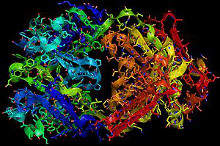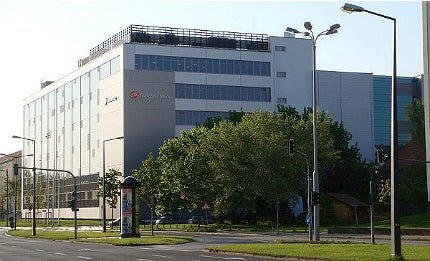
Roche’s injectable Herceptin formula endorsed by the EU
Roche has won EU approval for a new injectable formula of its breast cancer drug, Herceptin, to treat the HER2-positive type of the disease.
The formulation will decrease the amount of time that it takes to administer the prescription, reducing the amount of time patients spend in the hospital receiving treatment.

Discover B2B Marketing That Performs
Combine business intelligence and editorial excellence to reach engaged professionals across 36 leading media platforms.
This approval comes on the heels of the European Medicines Agency’s (EMA) decision to provide marketing authorisation to GlaskoSmithKline for breast cancer drug Tyverb, which can be used in conjunction with Roche’s Herceptin.
Bayer’s hypertension drug granted designation by FDA
Bayer HealthCare has been given two separate orphan drug designations from the US Food and Drug Administration’s (FDA) Office of Orphan Products Development for its investigational oral drug riociguat, for treating pulmonary arterial hypertension (PAH) and chronic thromboembolic pulmonary hypertension (CTEPH).
The US Orphan Drug Act grants special status for medications developed to treat and prevent rare medical conditions and diseases.
Bayer first submitted a new drug application (NDA) for riociguat in February 2013 for the treatment of PAH in order to improve exercise capacity and as a remedy against persistent or recurrent CTEPH.

US Tariffs are shifting - will you react or anticipate?
Don’t let policy changes catch you off guard. Stay proactive with real-time data and expert analysis.
By GlobalDataFDA approves first generic of Xeloda for colon cancer
The US Food and Drug Administration has given approval to Teva Pharmaceuticals for the first generic version of Roche’s colon cancer drug Xeloda.
Xeloda, also known as capecitabine, is a chemotherapy drug that can be used to treat cancer of the colon or rectum that has spread to other parts of the body and metastatic breast cancer.
Israel-based Teva can market its cheaper generic version in 150mg and 500mg strengths.
Genzyme’s multiple sclerosis treatment approved by European Commission
Sanofi and its subsidiary Genzyme have been given marketing approval by the European Commission for Lemtrada (alemtuzumab), a treatment for multiple sclerosis.
Lemtrada is administered intravenously for adult patients suffering from relapsing remitting multiple sclerosis (RRMS).
The medication comes in 12mg doses and requires two annual treatments.
AstraZeneca strikes licensing deal with Merck for ovarian cancer treatment
Merck has signed a worldwide licensing agreement with AstraZeneca for its ovarian cancer drug, which is currently in Phase II clinical studies.
Under the agreement, AstraZeneca will pay Merck a $50m upfront fee and, in addition, Merck will be eligible to receive future payments tied to development and regulatory milestones, plus sales-related payments and tiered royalties.
AstraZeneca will be responsible for all future clinical development manufacturing and marketing.
GSK cancer vaccine fails to pass melanoma clinical trial
An experimental drug from GlaxoSmithKline has been unsuccessful in a late-stage clinical test to treat patients with melanoma.
Its MAGE3-A3 therapeutic vaccine underwent an independent analysis, which demonstrated that the study, DERMA, did not meet its first co-primary endpoint as it did not drastically extend disease-free survival (DFSiii) when compared with placebo in the MAGE-A3 positive population.
MAGE-A3 is an antigen that creates tumours and is seen in a variety of cancers, including melanoma, with no presence in healthy cells.
GSK signs deal with BARDA for anti-anthrax medication
GlaxoSmithKline (GSK) has signed a four-year contract with the Biomedical Advanced Research and Development Authority (BARDA), a division of the US Department of Health and Human Services (HHS), for the supply of its anthrax inhalation treatment, raxibacumab.
The US Government is purchasing the medication as a means to combat a potential bioterrorist attack.
The new contract requires GSK to provide 60,000 doses to the US Government in the next four years, at a cost of $196m.
Novel brain cancer drug shows positive signs in Phase I clinical trial
An innovative brain cancer drug undergoing a Phase I clinical safety trial has shown preliminary positive results, Dutch biotech firm to-BBB has announced.
The drug, known as 2B3-101, has shown promising signs of anti-tumour activity in many patients at the higher dose levels tested, according to Dr Dieta Brandsma from the Netherlands Cancer Institute – Antoni van Leeuwenhoek hospital (NKI-AVL).
Due to the initial positive findings another investigation into the efficiency of the drug will get underway.
Novartis enters partnership to develop stem cell technology
Swiss-based drug maker Novartis has entered into an agreement with Regenerex LLC to gain access to stem cell technology that may help kidney transplant patients avoid taking anti-rejection medicine for life.
The two companies, through an exclusive licensing deal, will work together primarily on research in this area.
Regenerex, a start-up biotechnology company based in Louisville, Kentucky, previously developed technology that enabled five out of eight kidney transplant patients to stop taking about a dozen pills every day to suppress their immune systems.
UCSD researchers develop new antibiotics detection technique
Biologists at the University of California, San Diego (UC San Diego) have developed a new procedure that can identify and characterise antibiotics.
The innovation could enable the detection of new antibiotics to treat antibiotic-resistant bacteria, such as carbapenem-resistant enterobacteriaceae (CRE) and methicillin-resistant staphlyococcus aureus (MRSA).
In the UC San Diego team’s findings, published online in the Proceedings of the National Academy of Sciences journal, researchers described their creation of a method of performing bacterial cell ‘autopsies’.





